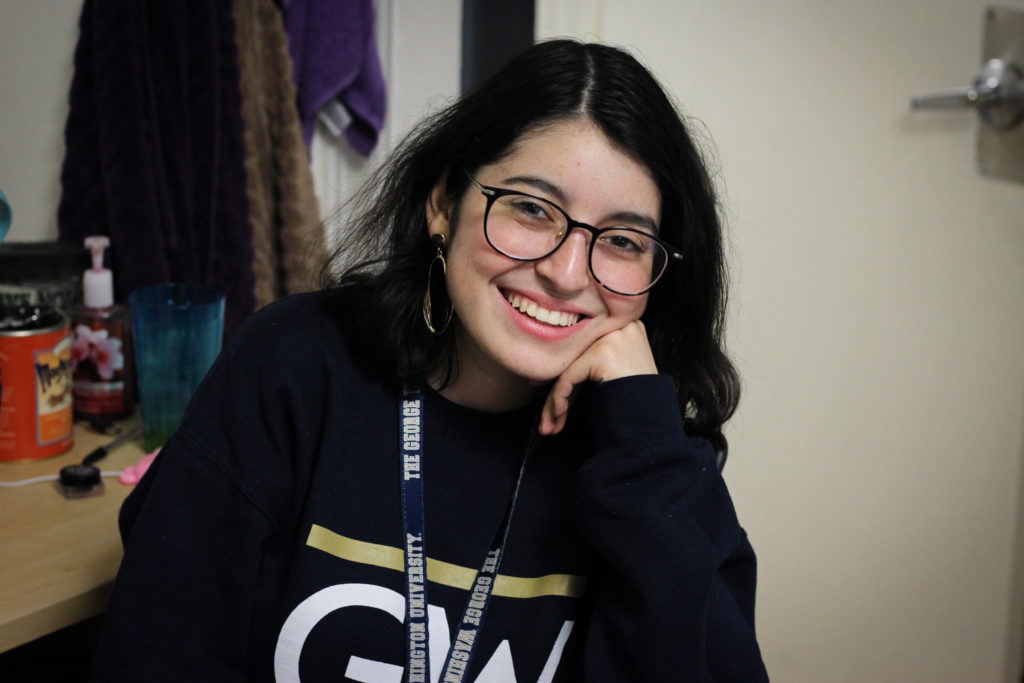A cohort of first-generation students now shares a floor in GW’s largest first-year residence hall.
For the first time, officials allotted a floor in Thurston Hall to about 60 first-year students who are the first in their families to attend college. In interviews, more than 10 first-generation students who were assigned to live on the floor said that on a campus where most other students have their parents to help them navigate college, living together on the floor helps them lean on each other for support.
Colette Coleman, the interim associate dean of students, said the residential community will “foster connections” among students who experience the same transition to college life. Coleman said officials hope the community provides students with “dedicated resources and opportunities” to manage their transition, develop academic skills and connect with other first-generation students.
“Living in a community where students have a shared experience provides a safe space for our first-gen students to build community and feel successful without having to explain any pressures and challenges they may be feeling,” she said in an email.
First-generation students indicated interest in living with the community in their housing application, Coleman said. Students living on the floor have a resident adviser who is also a first-generation student and will receive additional support from the Thurston area coordinator and the first-generation support coordinator in the Center for Student Engagement, she said.
“We hope that this community will find value experiencing their first year of college together and, maybe, next year stop by their old room to say hi to the next group of first-generation students to find their home at GW,” Coleman said.
In past years, officials have introduced special office hours for first-generation students in the Center for Student Engagement. A new student group also formed in 2015 to provide financial, academic and social support for first-generation students.
Students in the residential community, which is located on the eighth floor, said the floor gives them a support network they couldn’t get from family members at home.
Freshman Andrea Hinojosa said she wanted to live on the floor because first-generation students like her have a central place to find and support each other as the first students in their families to attend college.
“It’s nice to be surrounded by people who understand you and people who are in that same situation,” she said. “That doesn’t mean you can’t be friends with people who aren’t first-gen, but you notice a lot of people don’t understand how hard it is, how it’s such a big step to take, especially for the first.”
Freshman Nateé Himmons said it’s beneficial to live with other first-generation students “who are coming from the same situation of the unknown” because they can rely on each other to navigate campus life.
“Just being at this university of a higher income, higher socioeconomics – it’s just nice to know people are on the same level,” she said.
Freshman Kareemot Siyanbola said she didn’t know other first-generation students were assigned to a floor together until she came to campus at the beginning of the academic year.
She said that at a school where most other students have parents who also went to college, a floor dedicated to first-generation students allows for a more comfortable adjustment to school because they can rely on one another for advice about managing college work for the first time.
“My adjustment would have been very different because my roommates wouldn’t have been people of color – it’s more diverse,” Siyanbola said. “I wouldn’t have been surrounded by as much diversity had I not been on this floor.”
Freshman Alan Capon said he preferenced living with a community of first-generation students when he filled out the housing application. Capon said he wanted to be surrounded by others who are also first-generation students so he didn’t “feel like an outcast” when he arrived on campus.
“You want them to feel welcome and putting them with people like them,” Capon said. “That definitely encourages people to break out of their bubble that they’re in and just explore.”
Freshman Yen Liao said she chose to be part of the residential community because she wanted to be surrounded by people “in the same boat” as him. Liao said that instead of asking family members for help at school, she can talk with other students who also don’t have an outlet to talk with their family about classes or campus life.
“If you’re worried about something, if you’re stressed, you share kind of the same emotions,” Liao said. “It would’ve been a harder time to meet people and to relate to them if I weren’t in this community.”
Lizzie Mintz contributed reporting.





